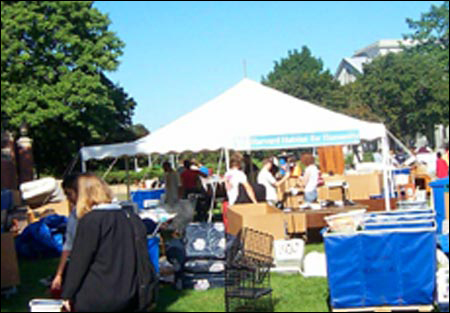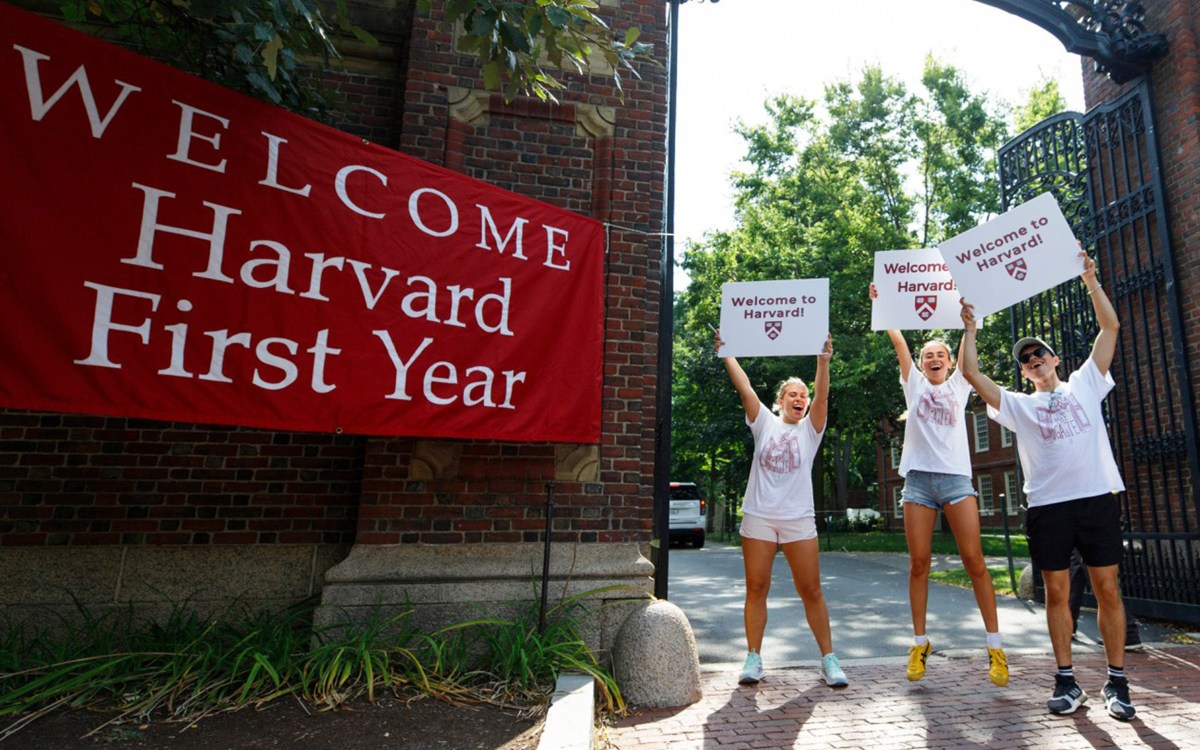Harvard recycling rates rise, hit record
University rates for fiscal 2003 top 36 percent

Harvard’s waste recycling rate continued its upward climb last year, reaching a record 36 percent and preserving enough paper fiber to equal 80 acres of forest cut for pulpwood.
Rob Gogan, supervisor of recycling and waste management for Facilities Maintenance Operations, said Harvard made significant improvements in recycling of construction debris and of computer screens. There were also more frequent collections at Harvard Real Estate Services Affiliated Housing buildings, Gogan said, and increased recycling rates in the dormitories, where a new program employing students as environmental monitors bore immediate fruit.
“I’m very encouraged because I’ve seen dramatic successes around campus,” Gogan said.
The 36 percent for the 2003 fiscal year, which ended June 30, eclipsed the 32 percent record set in 2002. The 36 percent equals 5,272 tons of recycled material, which saved the University $85,000 in waste disposal fees. Environmental benefits from the recycling include preventing the production of 8,000 tons of carbon dioxide, a greenhouse gas implicated in global warming – equal to keeping 4,700 cars off the road last year.
Gogan said the University has made clear progress in recent years, but said there are still many opportunities to increase recycling. Harvard disposed of 9,500 tons of trash last year, enough to fill Harvard Stadium.
A year ago, Gogan felt there were so many opportunities to improve recycling on campus that he adopted an internal goal of recycling 50 percent of Harvard’s waste by 2005, a figure he said now looks a bit optimistic.
Gogan said two areas where improvements could be made include waste removal contracts within buildings, which he said sometimes don’t specify that recycling has to be picked up, and in catering contracts.
‘We knew it was ambitious. If you aim low, that’s what you get. If you aim high, sometimes you make it.’
– Rob Gogan, Supervisor of Recycling and Waste Management
Catering, Gogan said, is extremely common at Harvard and often doesn’t include recycling opportunities. Both facts are reflected in the University’s waste stream. He estimated that 10 percent of the waste in academic buildings, by weight, is unfinished beverages and their bottles. Gogan suggested that future catering contracts include provision of recycling containers at gatherings so that recyclables are handled properly instead of being thrown away.
One major success story last year was the spring move out, when students often dispose of old clothes, furniture, and personal items rather than packing and moving them home. In 2002, Gogan said, the students generated about 95 tons of trash, piled in large containers put near the dorms. Last year, he said, that improved by about 30 percent, to 65 tons. Perhaps not coincidentally, contributions of furniture and other items to Harvard Habitat for Humanity soared and many of the items were resold in the organization’s fall sale to students moving in.
In addition, Gogan said, they collected 13 tons of used clothing from the dorms last spring, which was sold to a textile dealer. The proceeds of that sale were used to help area homeless, with some of the income going to the Pine Street Inn and to the Harvard Square Homeless Shelter, in the basement of the University Lutheran Church.
Recycling in the undergraduate dormitories improved by 25 to 30 percent, probably due to the Inter-House Resource Efficiency Program, which paid student representatives to encourage recycling, conservation, and other environmentally friendly behaviors. The program was in its first year last year. The improvement was encouraging, Gogan said, but recycling in the dormitories has been so low that there’s still room for improvement.
Composting of organic waste also improved, Gogan said, as more campus kitchens were added to the composting program. A truck regularly visits the kitchens in the program and brings their organic waste to a composting facility.
Gogan is hoping to stoke student, faculty, and staff competitive juices this spring with an expanded Recycle Mania competition. Last year, Harvard came in fourth among eight colleges which competed to see which could recycle the most over 10 weeks. This year, he’s hoping to expand that to 16 schools.
“It’s a way to make this environmental stuff fun,” Gogan said.




